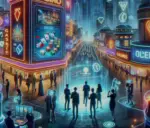“I don’t believe you can separate facts from values,” Frederick Turner, a literature professor at the University of Dallas, told C&EN. Speaking to the interdependent nature between STEM and humanities, Turner continues, saying, “I don’t believe we can understand the humanities without understanding something about human biology. At the same time, I don’t believe we have any systematic way of imagining or hypothesizing other than the humanities.”
Unfortunately, educational institutions, from grade schools to universities, are attempting to segment academic discipline in exactly the fashion Turner rejects. Today’s classrooms seldom foster true self-discovery, or encourage broad intellectual inquiry, or adequately prepare students for a world beyond pearly white campus gates. They’ve instead taken to fabricating artificial environments in which STEM and humanities are not only partitioned, but made perpetual adversaries.
In one corner of this academic boxing ring stands STEM: Science, Technology, Engineering and Mathematics. Weighing in at 555,545 U.S. graduates in 2016, STEM is a fierce opponent whose curriculum seeks proficiency in traditionally hard sciences, which rely on testable predictions, controlled experiments, mathematical models, quantifiable data and objectivity.
In the opposing corner, weighing in at 373,507 U.S. graduates in 2016, humanities are fast falling from their fan-favorite pedestal. Humanities traditionally include disciplines such as history, languages, literature, philosophy, classical studies, religion, art, law, politics and human geography. Though some argue humanities are better defined not by the encompassing subjects but rather by how the field shapes those who take up its study.
“Through studying the humanities, one has the opportunity to get to know oneself and others better,” writes Gerald Greenberg, senior associate dean at Syracuse University. “The opportunity to become better able to understand and grapple with complex moral issues, the complexities and intricacies of humanity.”
Although strict academic definitions seem to drastically differentiate STEM and humanities, the two are naturally associated with one another. Sir Isaac Newton, for example, is known to most as the mathematician and physicist who developed the three laws of motion and law of universal gravitation. But he also mastered Latin, dove into the mechanical philosophy of French philosopher René Descartes and even devoted his later years to interpretation of religious prophecies.
The degree of unity between STEM and humanities is apparent even in ancient Greek philosophy. Pythagoras, whom you can thank for the Pythagorean Theorem of right triangles, founded a religious brotherhood whose studies included the metaphysics of numbers, music, astronomy and even the nature of souls. Aristotelianism, Platonism, Stoicism and other later philosophical schools similarly explored metaphysics, ethics and morality in addition to what modern readers consider hard sciences — mathematics, cosmology and natural philosophy (or physics).
Despite a rich, ancient history attesting to the intimately connected nature of these disciplines, society slowly began cleaving them from one another, often claiming practical superiority of STEM. The years following the Great Recession only heightened this rhetoric of divergence. Between 2009 and 2015, the number of STEM major in bachelors-and-above programs grew by 43%, while humanities declined negative 0.4%.
Parents and academic counselors encouraged STEM studies as they thought it increased the likelihood of their children and students getting jobs after graduation, especially in wake of the recession. Though an understandable sentiment, it is unfortunately not completely accurate.
STEM provides job specific training but, in isolation, fails to offer a broad foundation for further career development, leaving students at risk when jobs in their designated STEM fields are unavailable — which is a looming possibility. Some studies indicate that universities are now graduating more STEM majors than there are STEM occupations available. There is also an element of prestige associated with STEM degrees, making pride a motivating factor for choosing the field as well.
“Knowing science kind of stands in for smartness in a way that knowing Shakespeare used to stand in for that,” Deborah Fitzgerald, a history of technology professor at MIT, told C&EN. “It’s a placeholder for ‘my kid is a smart kid.’ The danger is in the parents of kids at elite universities who really think their kids just have to zero in on that science.”
The implications of radically favoring STEM and discouraging humanities is detrimental both to society and individual students. As a sociology teacher of mine once noted, a society that only produces doctors and lawyers is doomed to fail. Where would we be without trash collectors? Waiters? Grocers? Janitors? Society continually degrades these professions and yet fundamentally relies on them. The same is true of STEM and humanities — with only mathematicians and engineers, who will record our history? Inspire our creativity? Challenge our politics? Foster our language?
“Within the sciences, one can learn about what happens when tiny particles collide, which can open the window into the universe,” Gerald Greenberg observed. “Within the social sciences, one can learn about how resources are used by people and companies, which can lead to an understanding of how the economy might develop. Within the humanities, one can learn another language, which can open the window into a new culture, a new worldview.”
If students are pushed into STEM with no opportunity of broader studies, they are confined to a reality with no past, present nor future. They are forced to exist in a world without individualism, dialogue or conflict. As Fitzgerald also noted, universities are giving STEM students a blatantly false impression that the pristine classroom environment translates to the real world when, in fact, life beyond campus borders is saturated in both human and scientific problems that can only be understood in the context of culture, language, philosophy and history.
Even more devastating is that university programs are often so strict in their segregation of STEM and humanities that those within STEM are unable to study the history of their own field. Astronomy and physics, for example, are ancient fields of study. Students in these disciplines would benefit to know their origins, development and religious implications. STEM is as much a humanist field as it is a scientific one and, in denying this, “STEM Only” advocates are inhibiting the very field they feign to promote.
Hanging up the gloves in this brutal battle will be no easy task. Individual professors can incorporate STEM and humanities into their respective classrooms by provided context for one discipline against the backdrop of the other. Universities can stop paying mere lip service to interdisciplinary studies by arranging academic programs that allow students to take classes outside of their major, without major implications for graduation requirements or financial burdens. Providing equal or comparable funding and marketing for both STEM and humanities is an imperative component of fostering academic freedom and integration.
But these are only temporary fixes on a small scale. True change will occur only when society ceases belittling humanities as a “dead-end major.” Lana Del Rey, an award-winning musician, studied philosophy. J.K. Rowling, weaver of magical worlds, majored in classical studies and French. This list of humanities majors with successful careers, both within and beyond what they studied, is endless.
More important than careers and job success, however, is the interest of students. The choice of majoring in STEM or humanities must be motivated by a fascination and intrigue in said subject — not from societal pressures and myths. Their chosen field of study, or hopefully multiple fields of study, should expand both their academic knowledge and understanding of who they are as a person. Society artificially designed the feud, meaning student must not let the STEM versus humanities fight influence their academic path. What matters is what they learn, and how they learn, throughout the educational process.

















A man without a dream is like a dead man흥신소